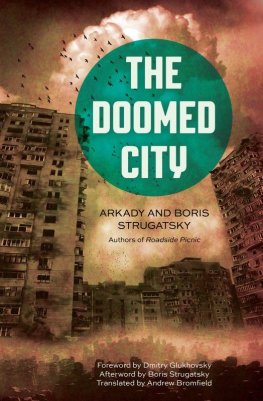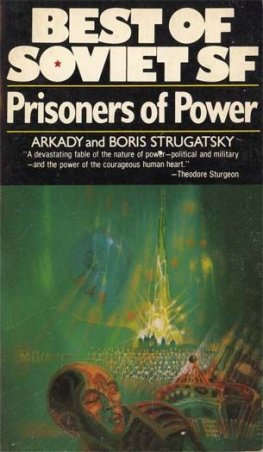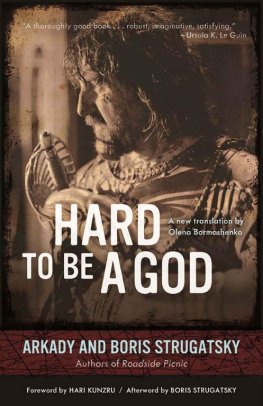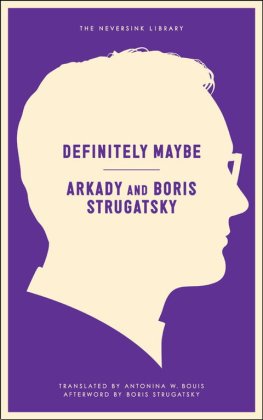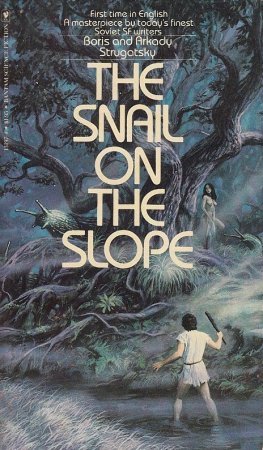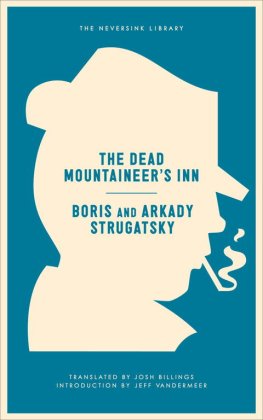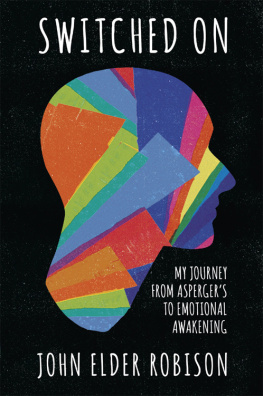Arkady and Boris Strugatsky
The Doomed City
Copyright (c) 1989 by Arkady and Boris Strugatsky
Foreword copyright (c) 2016 by Dmitry Glukhovsky
Afterword copyright (c) 2001 by Boris Strugatsky
All rights reserved
Published by Chicago Review Press Incorporated
814 North Franklin Street
Chicago, IL 60610
ISBN 978-1-61374-996-8
This publication was effected under the auspices of the Mikhail Prokhorov Foundation TRANSCRIPT Programme to Support Translations of Russian Literature.
Library of Congress Cataloging-in-Publication Data
1933-2012, author. | Bromfield, Andrew, translator.
Title: The doomed city / Arkady and Boris Strugatsky; translated by Andrew Bromfield.
Description: Chicago: Published by Chicago Review Press Incorporated, 2016.
Identifiers: LCCN 2016009300 (print) | LCCN 2016010274 (ebook) | ISBN
9781613735961 (hardback) | ISBN 9781613749937 (pbk.) | ISBN
9781613749944 (PDF edition) | ISBN 9781613749968 (EPUB edition) |
ISBN 9781613749951 (Kindle edition)
Classification: LCC PG3476.S78835 G7313 2016 (print) | LCC PG3476.S78835
(ebook) | DDC 891.73/44 -- dc23
LC record available at http://lccn.loc.gov/2016009300
CONTENTS
Foreword by Dmitry Glukhovsky
PART I: The Garbage Collector
PART II: The Investigator
PART III: The Editor
PART IV: Mr. Counselor
PART V: Continuity Disrupted
PART VI: Conclusion
Afterword by Boris Strugatsky
FOREWORD: THE EXPERIMENT
by Dmitry Glukhovsky
No Western science fiction writer, either American or European, has ever been as famous as the Strugatsky brothers were in the USSR. In the 1970s, whenever their latest book appeared, with an initial print run of only 500,000, only the truly fortunate were able to read it immediately. In 1979, Tarkovsky's film Stalker, based on the Strugatskys' Roadside Picnic, would finally win them recognition from the Soviet intelligentsia, and The Enchanters (1982), a screen adaptation of their story of magic Monday Starts on Saturday, would soon become an all-time audience favorite. But well before that, a long queue of relatives, friends, and work colleagues immediately formed for each one of those half-million books. Nobody found this daunting. We were used to having to stand in line and wait for the most valuable things. A month for a book, five years for a car, ten years for an apartment...
Of course, the difference was not merely in how many people knew the Strugatskys. The Strugatskys were known to the entire reading public of the Soviet Union, but there are also Western science fiction writers known to almost everyone.
The difference is in the attitude.
In the West, science fiction was always more the domain of dreamers. Science fiction literature filled a niche that it still fills to this day -- a niche, moreover, that is growing narrower with every year that passes.
But in the USSR it became the absolutely genuine mainstream. The Communist Party and the government were implementing a grandiose project to remodel society, the state, the individual, and the entire world all at once -- a project so fantastic that in comparison the most audacious of writers' fantasies seemed to be no more than a forecast of what was coming tomorrow. Standard Soviet science fiction -- and the Strugatskys' early prose -- transported us into the future promised by the ideologists: a future that was just and bright; a future in which communism had triumphed and peace had reigned on Earth for a long time already, Russian had become the language of international dialog, and all the dramatic events unfolded far out on the remote boundaries of the galaxy, to which earthlings carried progress and prosperity.
In the USSR the present day was always hard, but the deprivations seemed justified: all of us, as a country, were simply standing in line for a happy tomorrow. And science fiction writers showed us what was waiting for us there, at the radiant shop counter of destiny, in the communist paradise. They were obliged to show it: if you went up on tiptoe, you could see the front end of the queue. In the early 1960s, Khrushchev promised the advent of communism by 1980. Five years for a car, ten years for an apartment, twenty years for paradise... It turned out that we could get there simply by staying alive. In paradise, rationality and humanism would be triumphant. Everything there would be honest and just. In paradise, it was explained to us, absolutely everything would be free; society would take from each according to his abilities and give to each according to his needs. This was a plan that we were eager to believe in. And we tried to believe in it as much as we could.
The Strugatskys tried too. Having grown up in wartime Leningrad, they knew and remembered the price we had to pay for victory in the war, the price we paid for "the construction projects of the age," and the severity the shepherds were obliged to display if the flock they were driving along suddenly balked and refused to follow the trail to the Garden of Eden. But at the time it seemed that the end was simply too great and magnificent to ponder over the means.
In fact, any pondering could really only be done in the kitchen, among family and friends. And although in Khrushchev's and Brezhnev's time they didn't shoot people for their doubts, although the purges were condemned and the cult of Stalin's personality was debunked, the newspaper Pravda and Gosteleradio (the state television and radio service) were the only ones allowed to do the debunking, and then only precisely as far as was necessary within the limits of the clandestine infighting between the bulldogs of the Politburo.
Of course, Pravda, like the rest of the press, was not merely under the control of the state, it was the state's advance guard, its assault team. And so-called serious literature was another assault team of the same kind. The novels and stories that were published naturally performed precisely delineated political and social tasks: the heroic glorification of labor and military service, the depiction of everyday Soviet happiness, and the subtle interconnections between personal relations and relations of production. Everything else -- from Daniil Kharms to Bulgakov, and from Pasternak to Solzhenitsyn, was not recognized as literature, as if it didn't even exist at all. Writers were not supposed to create but to serve. To color in the sketches dashed off by the Communist Party ideologists.
Science fiction, however, possessed greater freedom in this respect. After all, it wasn't about the present day and it wasn't about the Soviet Union. It didn't express any doubt that communism would triumph in the foreseeable future. It apparently didn't stick its nose into current business, but was always talking about something distant and abstract. So the demands made of it were different, gentler. But even so, there were demands: science fiction was no less subject to censorship than everything else that was published on paper.
Time passed, the country was still dawdling in the queue, and the shop counter selling happiness and justice was fading into the hazy future. Khrushchev, who had promised everyone communism within a lifetime, was toppled, and those who replaced him limited themselves to granting people the ownership of plots of land, each six hundred square meters, so that they could build dachas on them. Tomorrow refused to arrive; it kept on being postponed until the day after tomorrow, owing to technical difficulties. People started whispering uneasily in the queue. And as the leaders of the country grew old and relapsed into senility, the whispering grew louder. It was becoming clear that we were standing in the wrong queue. And the most frightening thing was that we might

